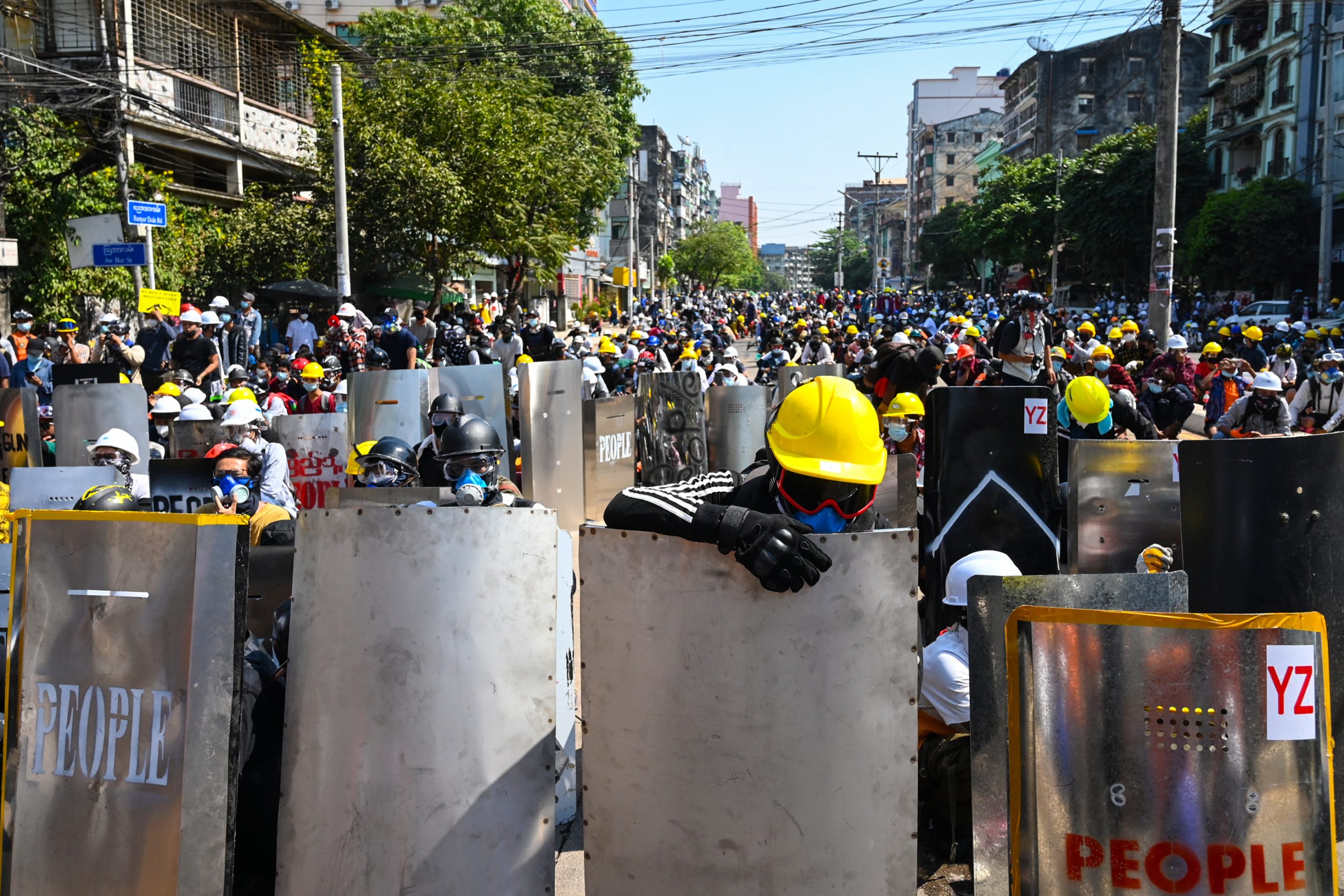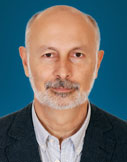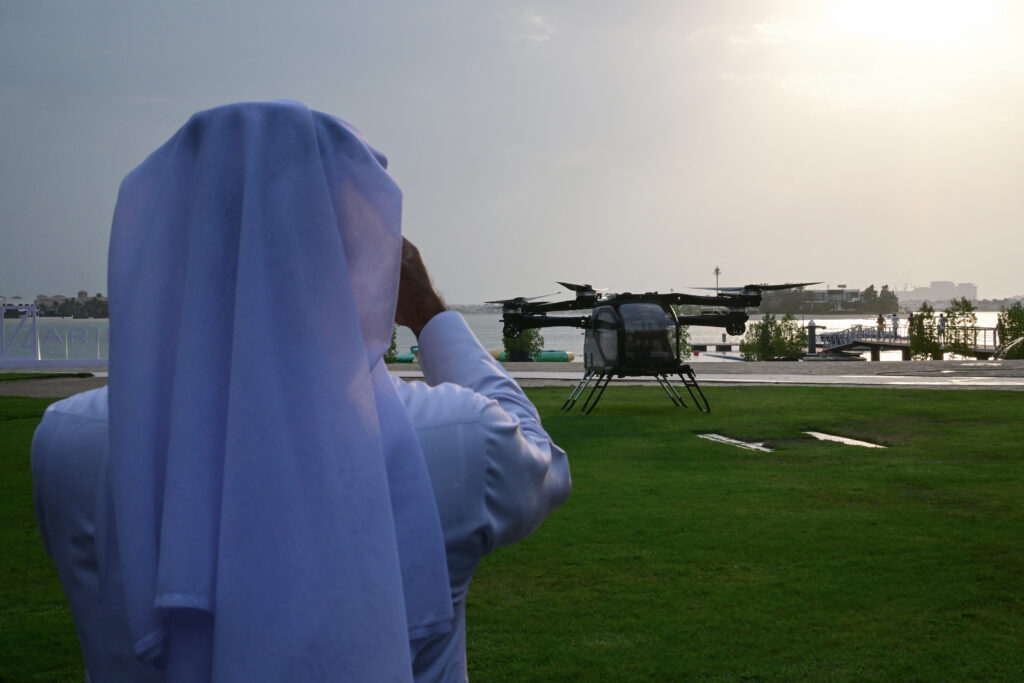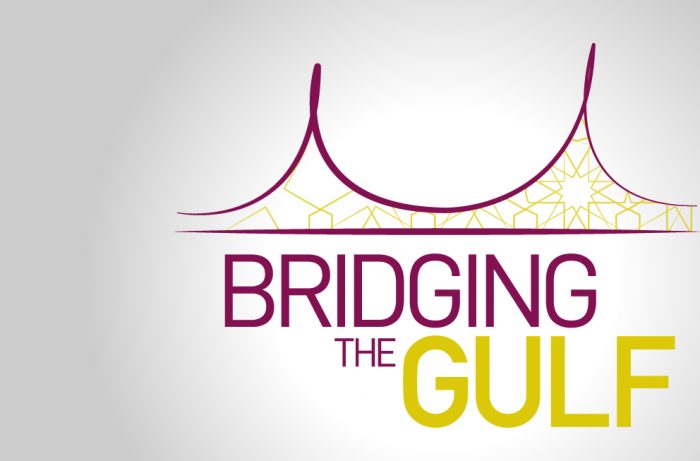
- 24 Mar 2021
Egypt and Myanmar: How the Military’s Economic Interests Complicates Political Transition
(This event is organised by MEI’s Political Economy Research Cluster.)
Abstracts
Egypt and Turkey: The Military’s Economic Stake and the Path to Political Transition by Dr Yezid Sayigh
Comparison between the political and economic roles of the National Armed Forces in Turkey and Egypt allows three principal insights. First, the degree to which the military is committed to a dominant economic model has a major bearing on the form and purpose of its own economic activity. It follows that the lack of a clear vision for the path to capitalist development, or an enduring legacy of non-capitalist path to development, allows opportunistic economic activity and raises the military’s stake in holding on to state power.
Second, the retreat of the military role in national politics and government is heavily contingent on social transformations resulting from economic modes that generate significant social classes and private sectors with a higher relative degree of autonomy from the state. The converse is also true – the military may tighten its grip where economic mode and state power impede social transformation of this kind and instead, generate concentration of wealth and widen income disparity.
Lastly, the preceding two dimensions are reflected in the political domain: in a multi-party system, the military tends to act as a balancer and arbiter whereas in a one or non-party system, the military tends to entrench its role as a regime pillar and further concentrate all forms of power in the state.
The Military Coup in Myanmar: Taking Care of Business by Dr Htwe Htwe Thein
The coup in Myanmar is partly about protecting the military elite’s economic interests. These interests are vested in two vast military-owned conglomerates – Myanmar Economic Holdings Limited (MEHL) and Myanmar Economic Corporation (MEC). The spectre of the democratically elected National League for Democracy gradually diluting the military’s political power also challenged its economic power. The military’s conglomerates were established in 1988 when the armed forces were in full control of Myanmar. As market players, they benefitted from Myanmar’s embrace of international trade with Asian investors who, unlike their Western counterparts, did not adhere to US sanctions imposed in 1997 and were only lifted after the political transition in 2011.
Myanmar’s isolation allowed the military to strengthen the conglomerates’ grip on the economy and enrich senior military personnel by controlling licensing, issuing concessions and developing partnerships with Asian investors and emerging domestic private businesses that were dependent on the armed forces. The military maintained its economic interests and partnerships over the last decade despite the transition from military to quasi-civilian rule in 2011 and the subsequent shift into-quasi democratic rule.
That is the primary reason why the Civil Disobedience Movement, since the coup on 1 February 2021, has emphasised a boycott of products and services provided by the military’s conglomerates as well as domestic and international businesses that are part of the armed forces’ nexus. The focus on the nexus highlights the need for future transition to involve both political and economic change and the international community can contribute to that by designing sanctions accordingly.
This public talk will be conducted online via Zoom on Wednesday, 24 March 2021 from 3.00pm to 4.30pm (SGT). All are welcome to participate. Successful registrants will receive a confirmation email with the Zoom details closer to the date of the event.
This event is free, however, registration is compulsory.
Image caption: Protesters hold homemade shields during a demonstration against the military coup in Yangon on 8 March 2021. (Photo by STR / AFP)
Listen to the full event here:
Watch the full event here:
Read the Summary of Event Proceedings:
By Tan Feng Qin
Research Associate, Middle East Institute, National University of Singapore
Dr Yezid Sayigh, senior fellow at the Malcolm H. Kerr Carnegie Middle East Center and Dr Htwe Htwe Thein, associate professor in International Business at the School of Management, Curtin University, discussed the relationship between the economic interests of the military and their role in political transitions in Egypt and Turkey, and in Myanmar, respectively.
The February 2021 Coup in Myanmar and the Military’s Economic Interests
Dr Thein began by giving an account of the 1 February coup in Myanmar, which in her view was partly about protecting the economic interests of the military elite. The Myanmar military had gained economic stakes while it was in political power from 1988 to 2011 and were now looking to regain political power to protect these accrued economic interests.
The military’s economic power rests in two conglomerates: the Myanmar Economic Corporation (MEC) and the Myanmar Economic Holdings Ltd (MEHL). The Myanmar military felt threatened and feared the dilution of this economic power when the National League for Democracy (NLD) won a landslide victory in Myanmar’s parliamentary elections in November 2020, especially since there had been some indication from the NLD that they intended to demilitarise Myanmar’s bureaucracy and government in the new parliamentary term.
The General Administration Department, for example, had previously been under Myanmar’s Ministry of Home Affairs. The department, which has the power to appoint key bureaucratic positions, had now come under the civilian control of the NLD and the military faced the spectre of having the bureaucracy slowly filled with democratically inclined NLD members, which would have threatened their economic interests.
The NLD has also indicated that they were looking to change laws governing mining, for instance, to give small or medium enterprises the right to mine, which would infringe upon a sector currently dominated by the military and its crony companies. The mining sector is a lucrative one and reports have variously indicated that it could make up half or even most of the country’s economy. There had also been indications that the NLD were looking to loosen the military’s grip on profitable jade mines in northern Myanmar.
The Military in Myanmar: A Brief Overview
To provide further context, Dr Thein gave a brief overview of Myanmar’s history and the development of the military’s view of itself as the nation’s protector. The military not only played a big role in Myanmar’s anti-colonial movement against the British, but also in fighting separatist ethnic insurgencies. A military coup in 1962, after a brief period of parliamentary rule, introduced Myanmar to socialism and ushered in a period that greatly weakened Myanmar’s economy. In 1988, the State Law and Order Restoration Council was established and its successor, the State Peace and Development Council, retained power until 2011. Even so, the presence of successive military governments in Myanmar’s history has helped ensure that the military has been able to retain a permanent and dominant role in the country’s politics, even as it had formally returned to barracks prior to this year’s coup.
The Military in Myanmar’s Economy
The two military conglomerates, the MEC and MEHL were established during a transition from a socialist economy to one based on marketisation after 1988, where efforts were made to open up Myanmar to international trade. Myanmar’s military took advantage of the opportunity not just to modernise the economy, but also to take advantage of the foreign direct investment the country was receiving to make money for itself and to use revenues to support the welfare of its retired personnel, active servicemen and the top ranks who have their own shares in the two conglomerates.
With Myanmar soon coming under US sanctions during the administration of President Bill Clinton, Myanmar was forced to seek economic ties closer to home, including with countries like China, Malaysia and Singapore. This era saw an economy skewed towards working with Asia but also focused on jade mining, oil and gas extraction, land purchases and unproductive economic activity damaging to ordinary people in Myanmar. The two conglomerates helped to cement the dominant position of the military during this period.
They raised capital through the privatisation of state-owned enterprises in the 1990s in two waves. Myanmar’s properties and land fell under the military-owned conglomerates and their close associates, ushering in a period of “crony capitalism.” As these conglomerates are large monopolies, those who wanted to do business in Myanmar were forced to go through them, especially since they controlled the provision of import and export licenses. These were a lucrative source of income for the military and the cronies, as were land sales and the exploitation of mining opportunities.
Economic Pressure Points toward a Political Transition?
Dr Thein noted that the United Nations’ reports detailing the military’s economic interests and foreign and business ties have allowed international and domestic pressure to be applied on the military since February’s coup. While visa bans have been less effective, asset freezes have had more impact on the holdings of Myanmar’s top military generals. More effective measures would be targeted sanctions on the two military conglomerates.
Two movements in Myanmar are applying domestic pressure on the military. The first is the Civil Disobedience Movement (CDM) which advocates the boycott of products and services associated with the military. The second is the Social Punishment Movement, which seeks to publically identify individuals associated with the military and to ostracise them by pushing for the international community to cancel visas or calling for merchants to refuse services. Ultimately, Dr Thein believes that the link between the political and economic interests of the military will have to be dismantled to move Myanmar towards democracy.
The Military’s Economic Role in Turkey and Egypt
Dr Sayigh laid out the Turkish and Egyptian cases to consider how the military’s economic interests might impede political transition, or if these interests might be leveraged to facilitate a transition, using the cases to illustrate three particular insights.
First, he notes that how a military approaches its business activities depends on the economic dimension, or the dominant economic model in a country. The military’s business activities emerge within a specific setting which militaries then manoeuvre around. Second, the military’s relationships to various socioeconomic actors in a country, such as the private sector or the business community, also affect its political role. These relationships, or the social dimension, affect the balance of interest between the military’s businesses and these actors, which themselves operate in the economy and seek to pursue their own interests. Last, is the political dimension of how the military behaves and whether it competes equally with other actors in the economy or uses its political position to take what it wants. The economic dimension sets the stage for how the military economy plays out, socially and politically and this affects how the military’s economic interests ultimately relate to political transitions.
The Economic Dimension
While Turkey and Egypt started at a comparative level of development in the 1950s, they thereafter diverged in their economic approach. Turkey adopted a capitalist path with a focus on state assistance for private sector development, especially in manufacturing. This allowed for the emergence of very large conglomerates comparable to South Korean chaebols.
The Turkish economy is also well globalised and integrated into global value chains. It has high levels of market integration, with different social groups active in the market. This allowed Turkey to build itself up as a middle-income country while Egypt was still lagging behind. The Turkish military was also consciously committed to a capitalist path of development and industrialisation. When it intervened to assert stability, it did not retain power but gave it back to civilians whom it felt would continue to pursue the same economic model.
In contrast, Egypt shifted early to a non-capitalist path to development, with extensive nationalisation and state-led industrialisation which continued from 1961 to 1991. Egypt then went through two waves of partial privatisation which nevertheless left the state still very much in control of the economy. Even though the economy is now perhaps 75 per cent run and owned by the private sector, all economic activity remains effectively controlled by the state.
Unlike in Turkey, Egypt’s military lacked an economic vision, and did not intervene in policy until the revolution in 2011 that removed President Hosni Mubarak. It is really only since 2013 that Egypt’s military gained a major role in the economy under President Abdel Fattah Al-Sisi. It now delivers at least a quarter of all public works and much of public procurement, capturing contracts given out by government agencies and delivering on them using the private sector as subcontractors, making a big profit as the intermediary. In effect, Egypt’s military economy is predatory and rentier, with the military gaining its income through occupying a position of political power rather than generating sustainable economic growth.
Social and Political Dimensions
The Turkish economic model resulted in a large middle class, much of it autonomous from the state. It had a private sector with a fair number of large companies, a very large number of medium-sized companies and small and micro enterprises. With neo-liberal economic reforms starting in the 1980s and privileged access to the European Union from 1992, the Turkish middle class also diversified as the economy rapidly grew. This middle class included a large emerging number of “Anatolian Bourgeoisie” who were more conservative and Islamist-leaning and became the voting base for the Turkish President Recep Tayyip Erdogan’s Justice and Development Party (AKP).
In Egypt, the private sector is in contrast almost still entirely dependent on access to state contracts. As such, business is done through political and personal connections and bribes, with little investment in innovation or productivity. Only one per cent of Egyptian companies count as large or medium enterprises, with 99 per cent either small, micro or even nano enterprises. This translates into a middle class that is not autonomous but rather, extremely heavily dependent on state benefits and employment, and a private sector with a parasitical relationship to the state. Neither of these can provide a source of political opposition.
Political Implications
In Dr Sayigh’s view, political change does not come from a vacuum. Instead, it is those social forces that stand to benefit from political change that are likely to commit resources and even their lives to bringing about such change. In Turkey, a massive middle class, autonomous from the state, was able to endorse democratisation and bring an Islamic-leaning party to power. In Egypt, the opposite situation has prevailed.
Turkey’s military founded a very large holding company called Oyak. The companies within it however are normal companies run by civilians and operating entirely as private firms. Although the military has a share in these companies, it has not used its position to give itself market advantages unavailable to others.
In Egypt, the military has in contrast rejected bringing its businesses under any form of civilian control and has made it clear that it is unwilling to dismantle any part of its economic empire to allow either economic efficiency or civilian oversight. The Egyptian military’s major stake in the economy since 2013 is, in Dr Sayigh’s opinion, likely to make it more reluctant than ever to share power. In fact, under President Sisi, the military has now become central to setting economic policy, even in areas like digitalisation.
Highlights from the Question and Answer Session
When asked what conclusions might be drawn from a comparison of these three cases, Dr Thein said that the Myanmar military has claimed that, under the Company Act, its two conglomerates have become more similar to normal companies since 2016, although she noted that more reforms are in fact needed for this to be the case. Had such reforms occurred, the military’s conglomerates might have come closer to operating in the Turkish model, but since the coup, it seems more likely that the Myanmar military would aspire toward the Egyptian model laid out by Dr Sayigh instead.
Dr Sayigh thought it a fascinating insight that in Myanmar, unlike in Egypt, there was a significant presence of private sector businesses and businesspeople who were not completely dependent on the military and were just their business or political partners. Such people could potentially stand in opposition to the military. In Egypt, big businesspeople do not form a distinct class and have no political clout to negotiate collectively with Egypt’s president. This is different from Turkey, where major business players and economic and social classes emerged that served as a counterweight to the military.
On the question of how Myanmar and Egypt had tackled the issue of a political transition, Dr Thein examined the factors that have limited progress toward a transition since 2011. Attempts to change the constitution have been handicapped by the provision that 25 per cent of parliamentary seats had to be reserved for the military. The country’s civilian government was also unable to substantially affect the country’s economic development. Additionally, as many in the NLD were ex-political prisoners, their capability to spearhead government ministries has been quite limited. As such, there had not been much progress toward a transition.
Dr Sayigh noted that in Egypt, the military and various intelligence agencies have, since 2013, eliminated all possible political or social contenders. The few political parties that are left are small and have no role whatsoever. The result is that there is no political arena in Egypt but this also means that there is nobody in the country for the president and military to negotiate a transition with, should there be a fundamental breakdown of the economy or some other serious crisis. There are no organised groups of any significance to help ensure a peaceful orderly transition, and this is a very dangerous situation to be in for Egypt.
About the Speakers

Senior Fellow
Malcolm H. Kerr Carnegie Middle East Center, Beirut, Lebanon
Dr Htwe Htwe Thein
Associate Professor in International Business at the School of Management
Curtin University, Australia
Dr Yezid Sayigh is a Senior Fellow at the Malcolm H. Kerr Carnegie Middle East Center in Beirut, Lebanon, where he leads the programme on Civil-Military Relations in Arab States (CMRAS). His work focuses on the comparative political and economic roles of Arab armed forces and nonstate actors, the impact of war on states and societies and the politics of post-conflict reconstruction and security sector transformation in Arab transitions and authoritarian resurgence.
Previously, Sayigh held teaching and research positions at King’s College London, the University of Cambridge and the University of Oxford, as well as visiting positions or fellowships at Harvard University, Brandeis University, the American University of Beirut and the School of Oriental and African Studies. From 1998–2003, he also headed the Middle East program of the International Institute for Strategic Studies in London. Sayigh was also an adviser and negotiator in the Palestinian delegation to the peace talks with Israel and headed the Palestinian delegation to the multilateral peace talks on Arms Control and Regional Security from 1991–1994. From 1999, he provided policy and technical consultancy on the permanent-status peace talks and on Palestinian reform.

Dr Htwe Htwe Thein is an Associate Professor in International Business at the School of Management, Curtin University, Australia, where she has been teaching for the last 16 years specialling subjects on management in Asia, international business and cross-cultural interactions. She has also been involved in a range of service and leadership roles at the faculty and school levels since 2012.
Her research is interdisciplinary and it examines the role of responsible business in building sustainable businesses and communities, especially in developing countries. Dr Thein has country-specific expertise and close to 20 years of experience as a scholar on business and economic development in Myanmar. She is currently engaged in research projects on responsible business, governance in Global Production Network, corporate social responsibility, foreign direct investment and conflicts, organisational legitimacy, co-evolution of state-owned enterprises and human resource development – in the institutional context of Myanmar’s democratic political transition and increasing global economic integration.



